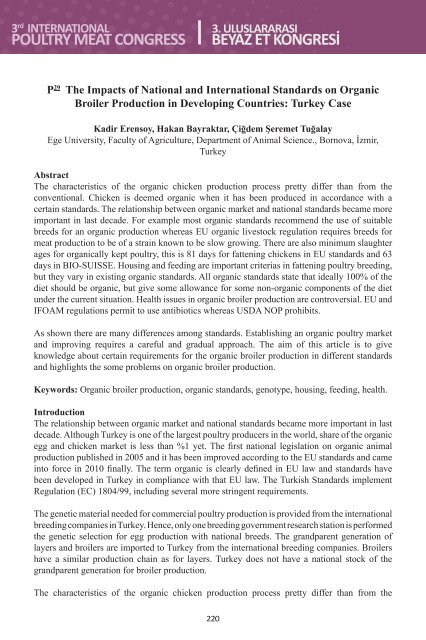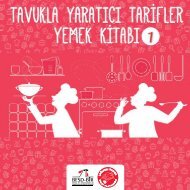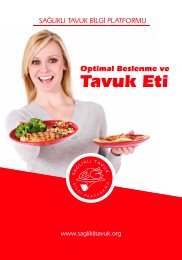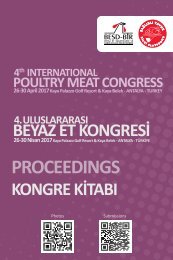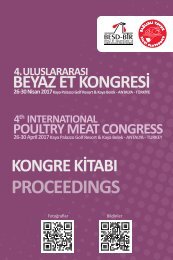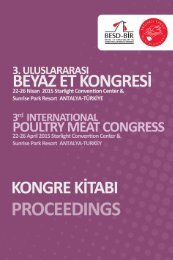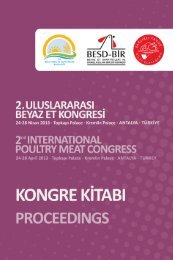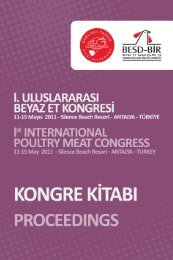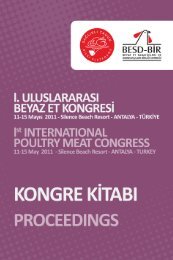3rd International Poultry Meat Congress
Proceedings
Proceedings
You also want an ePaper? Increase the reach of your titles
YUMPU automatically turns print PDFs into web optimized ePapers that Google loves.
P 29 The Impacts of National and <strong>International</strong> Standards on Organic<br />
Broiler Production in Developing Countries: Turkey Case<br />
Kadir Erensoy, Hakan Bayraktar, Çiğdem Şeremet Tuğalay<br />
Ege University, Faculty of Agriculture, Department of Animal Science., Bornova, İzmir,<br />
Turkey<br />
Abstract<br />
The characteristics of the organic chicken production process pretty differ than from the<br />
conventional. Chicken is deemed organic when it has been produced in accordance with a<br />
certain standards. The relationship between organic market and national standards became more<br />
important in last decade. For example most organic standards recommend the use of suitable<br />
breeds for an organic production whereas EU organic livestock regulation requires breeds for<br />
meat production to be of a strain known to be slow growing. There are also minimum slaughter<br />
ages for organically kept poultry, this is 81 days for fattening chickens in EU standards and 63<br />
days in BIO-SUISSE. Housing and feeding are important criterias in fattening poultry breeding,<br />
but they vary in existing organic standards. All organic standards state that ideally 100% of the<br />
diet should be organic, but give some allowance for some non-organic components of the diet<br />
under the current situation. Health issues in organic broiler production are controversial. EU and<br />
IFOAM regulations permit to use antibiotics whereas USDA NOP prohibits.<br />
As shown there are many differences among standards. Establishing an organic poultry market<br />
and improving requires a careful and gradual approach. The aim of this article is to give<br />
knowledge about certain requirements for the organic broiler production in different standards<br />
and highlights the some problems on organic broiler production.<br />
Keywords: Organic broiler production, organic standards, genotype, housing, feeding, health.<br />
Introduction<br />
The relationship between organic market and national standards became more important in last<br />
decade. Although Turkey is one of the largest poultry producers in the world, share of the organic<br />
egg and chicken market is less than %1 yet. The first national legislation on organic animal<br />
production published in 2005 and it has been improved according to the EU standards and came<br />
into force in 2010 finally. The term organic is clearly defined in EU law and standards have<br />
been developed in Turkey in compliance with that EU law. The Turkish Standards implement<br />
Regulation (EC) 1804/99, including several more stringent requirements.<br />
The genetic material needed for commercial poultry production is provided from the international<br />
breeding companies in Turkey. Hence, only one breeding government research station is performed<br />
the genetic selection for egg production with national breeds. The grandparent generation of<br />
layers and broilers are imported to Turkey from the international breeding companies. Broilers<br />
have a similar production chain as for layers. Turkey does not have a national stock of the<br />
grandparent generation for broiler production.<br />
The characteristics of the organic chicken production process pretty differ than from the<br />
220


